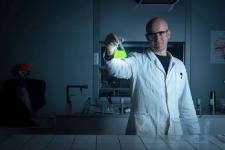Biotech execs in search of human guinea pigs find eager subjects: themselves
By Elizabeth Preston,
STAT
| 07. 07. 2016
When physicist Alex Zhavoronkov looked in the mirror one day and saw alarming swelling around his eyes, he guessed it was an allergic reaction to a drug he’d taken. But he couldn’t just ring up his doctor and ask — the drug was one his own company was developing, and he was its first guinea pig.
As CEO of biotech company Insilico Medicine, Zhavoronkov routinely subjects himself to his own medicine. Self-experimentation lets him quickly see whether lab predictions hold true in a human subject, or whether there are any safety issues — say, a potential allergy. (He now thinks the swelling may have been caused by a drug interaction with some tomato juice he drank.) And he thinks it has a place in the scientific literature, too: He plans to launch a journal of self-experimentation later this year.
Such experiments are one of medicine’s oldest traditions. Many a vaccine or poison was first tested on its developer; most of the earliest work on psychedelic drugs was conducted by intrepid scientists tripping in the name of research. As medicine has progressed, however, self-experimentation has become...
Related Articles
By Priyanka Runwal, Chemical and Engineering News | 08.05.2024
Saritee Sanodiya, 26, has spent countless days wondering if she’ll ever live a “normal” life. Growing up, Sanodiya often missed school, frequenting the hospital for sudden, life-threatening drops in her hemoglobin levels and excruciating pain in her joints. High fever...
It’s been a busy couple of months in biopolitics, with developments in the US, UK, China, Japan, and implicitly on Mars. Time for a brief roundup.
• • •
Bioethics needs an update
The National Research Act is now 50 years old. It was signed into law on July 12, 1974, as a direct response to publicity about the 1932 “Tuskegee Study of Untreated Syphilis in the Negro Male.” The Hastings Bioethics Forum celebrated its anniversary with an...
By Editorial Staff, The Lancet | 07.20.2024
Image by DrKontogianniIVF from Wikimedia Commons
Despite major advances in securing sexual and reproductive rights globally, one aspect is continually neglected: infertility. Evolving gender norms and financial precariousness have led to delayed childbearing, which increases infertility in both males and...
By Julia Black and Margaux MacColl, The Information [cites CGS' Katie Hasson] | 07.19.2024
When venture capitalist Jack Abraham first began dating his wife, Gabriella Massamillo, he insisted on one condition: that when they were ready to have children, she’d be willing to conceive using in vitro fertilization. Abraham had lost both his mother...




